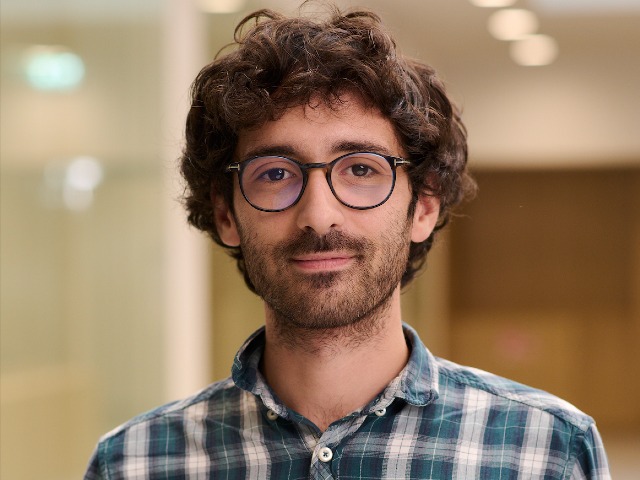Interview with PhD Candidate Michele Molè
| Date: | 12 June 2024 |

Michele Molè is a PhD candidate at the Faculty of Law. Below is a short interview, inquiring about his PhD research and teaching role in our International and European Law and Labour Law Master (Dutch law) programmes.
What is your specific academic background, and what are your research interests? Do you currently work on any specific research projects?
I obtained my Master's degree in law in 2019 at the University of Milan, after a short period at KU Leuven in Belgium. My master's thesis was on surveillance in workplaces using Artificial Intelligence and other digital tools. My aim was to understand what risks were involved for workers' rights and to propose a sustainable labour regulation to safeguard the workforce from potential abuses of digitalisation. This passion literally overwhelmed me, so much so that as soon as I finished my thesis, I wanted to go straight back to studying the same subject through a PhD on the same topic. Today, I am about to finalise my doctoral thesis, which I hope will become a book shortly. This passion has not only motivated me to pursue a doctorate but also to explore other sides of work and new technologies. In 2022 and 2023, I designed and coordinated an application to the interdisciplinary RuG fund with over 15 researchers from 7 RuG Faculties, and with the budget obtained we established panoptiwork.eu. With panoptiwork we organise seminars and activities for students on the topic of work and new technologies. At the end of this year, on December 2nd, we will organise a final conference where we will host some great speakers and present an edited volume in an academic journal.
What courses do you teach within the Faculty?
I usually give one lecture on fundamental rights at work and one on the GDPR in within the Technology Law track of the International and European Law LLB programme, specifically the courses Data Protection and Human Rights and Regulating Cybercrime. In these lectures, explore specific angles of digitalisation and the law. My task is therefore to explain the interaction between privacy, data protection, and labour law. I also teach in the Labour Law Master (Dutch law) programme.
What do you enjoy teaching about these courses?
I usually lecture on topics pertaining to my research, which motivates me to explain to students why studying labour and digitalization is an extremely topical issue. During my lectures, it often happens that students share their experiences from events at the workplace (both positive and negative). This shows the importance of work in our society and the need for competent labour lawyers, with knowledge regarding data protection. Teaching on matters that touch upon our daily experiences - including students' work - creates a certain engagement in the classroom with questions, remarks, and, indeed, personal experiences. I enjoy this mix and always have the feeling that, beyond exploring abstract and legal issues in those classrooms, we build consciousness in students on important issues such as social justice and labour protection.
How are the (degree) programmes you teach in unique compared to similar programmes elsewhere?
Well, Groningen is a great place if you have a keen interest in International and European Law. I teach mostly in the dedicated LLB and there students access a variety of courses and special tracks - such as the Technology Law Track. In this track, you pursue your LLB with an extra focus on technology law. After your LLB, you can continue with one of the many LLM programmes offered at the Faculty, including the Technology Law and Innovation LLM. I'd say that if you're all about technology regulation, the Faculty offers a complete education from LLB to LLM level, with further possibilities in specialising in subdomains of technology law; i.e. consumer law, energy law, intellectual property, artificial intelligence and so on.
What career prospects do you think there could be for students who pursue careers in your specific legal field of expertise?
Having a LLB and LLM in technology law with an interest in labour issues makes you a good candidate for law firms, since it's an increasingly requested domain of practice. This is similar for EU institutions and trade unions, where expertise in labour law and digitalisation is increasingly needed. Also, the big consultancy firms often require this expertise. Companies are willing to exploit more and better digital technologies to manage and supervise the workforce, therefore consultants in this field are highly requested!
Do you have any advice for students interested in pursuing your same field of legal expertise?
If you feel that labour and technology (law) studies fulfill your desire for social justice there's a lot happening in and outside of academia. A lot of scholars in recent years are writing interesting essays and books on the topic. Feel free to reach out to me (m.mole(at)rug.nl) if you want some reading advice. The same goes for other actors, such trade unions. I always recommend having a look at the interesting reports published by the European Trade Union Institute and the European Foundation for the Improvement of Living and Working Conditions. This is a topical field of studies and practice, so if these topics resonate with you do not hesitate to join it!
- Interview by: Dr. Chris Brennan, Marketing Advisor, Faculty of Law
--------------------------------------------------------------------------------------------------
Interested in more information about our programmes? You can ask questions directly to the Faculty by filling out our information request form.

